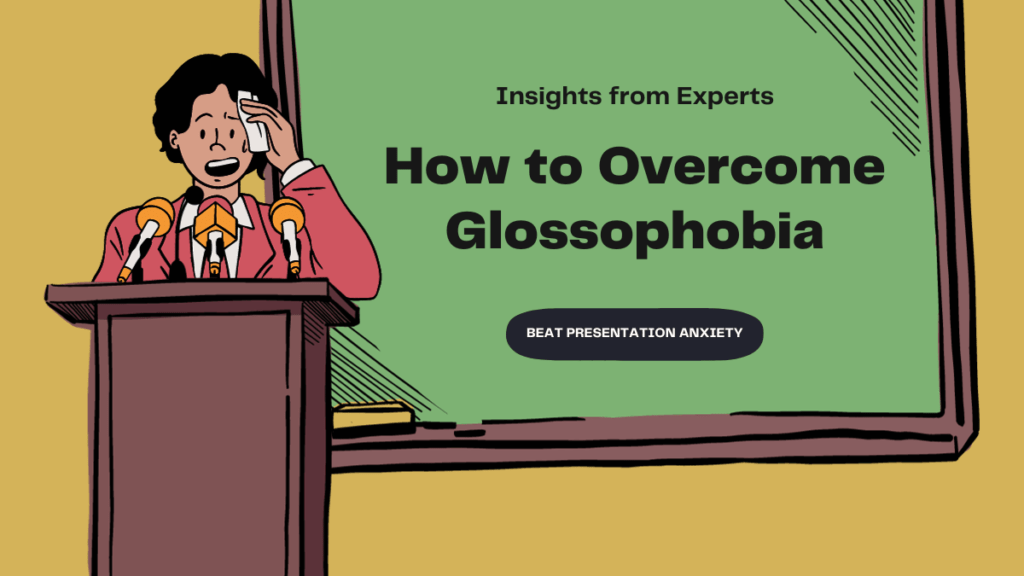Public speaking, often dubbed the “art of communication,” is a skill that can wield immense influence in both our professional and personal lives. It’s the tool that transforms ideas into action, individuals into leaders, and dreams into realities.
As the sage investor Warren Buffet eloquently puts it, “If you can’t communicate, it’s like winking at a girl in the dark—nothing happens. You can have all the brainpower in the world, but you have to be able to transmit it. And the transmission is communication.”
But here’s the paradox: while communication is vital, the very thought of public speaking sends shivers down the spines of countless individuals. This apprehension is recognized as glossophobia – an overwhelming fear of addressing an audience.
Surveys indicate that 72-75% of the population fears public speaking to some degree, making glossophobia one of the most common phobias. For many, it’s not merely a fear; it’s an incapacitating dread that can hinder personal and professional growth.
In this article, we explore the causes of presentation anxiety, the prevalence of glossophobia, and advice from experts on overcoming this fear.
The Roots of Presentation Anxiety and Stage Fright Panic Attacks
Public speaking involves presenting ideas, information, or stories to an audience to persuade or inform. It can range from presenting a business proposal to delivering a speech at a social event. The fear of public speaking is rooted in anxiety about being the center of attention and the possibility of making mistakes or being judged negatively.
Glossophobia is a specific social anxiety disorder. Public speaking anxiety may originate from various sources, such as:
- Fear of Judgement: Many people fear that their audience will judge them harshly, leading to feelings of inadequacy.
- Performance Anxiety: The pressure to perform well and the fear of making mistakes can lead to anxiety.
- Traumatic Experiences: Some individuals may have had negative experiences while speaking in public, which can intensify their fear.
- Self-Consciousness: Fear of being the focus of attention and self-consciousness about one’s appearance or voice can exacerbate glossophobia.
How Common is Glossophobia?
Glossophobia is astonishingly common, affecting a large portion of the population. Experts estimate that it impacts up to 75% of individuals. However, the severity of this fear can vary widely. Some people may experience mild nervousness at the prospect of public speaking. In contrast, others undergo full-blown panic attacks when faced with this situation.
Expert Advice on Overcoming Glossophobia
To better understand how to overcome the fear of public speaking, we contacted experts in the field for their insights.
1. Matt Eventoff, Founder of Princeton Public Speaking:
Eventoff emphasizes the importance of practice. He suggests that “The most important public speaking advice is to practice. The more one speaks, the less uncomfortable you become over time.” Practice not only improves your speaking skills but also boosts your confidence.
2. Warren Buffet, CEO of Berkshire Hathaway:
Buffet highlights the significance of early exposure to public speaking. He advises, “You have to do it; the sooner you do it, the better. Learning the right habits when you’re young is much easier. Just get yourself out there and force yourself into situations with people.”
3. Paul Russell, Doctor of Psychology and Managing Director of Luxury Academy:
Russell emphasizes positive self-talk. He suggests that you “Remind yourself that the people in the room want to listen to you and what you have to say. You could try putting a picture of a person that helps you to feel calm on the podium in front of you, and any time you feel nervous, pretend you are talking to them.”
Coping Strategies for Overcoming Glossophobia
- Know Your Material: Becoming intimately familiar with your subject matter through thorough preparation can significantly boost your confidence. This knowledge will provide a safety net during your presentation, helping you stay on track even if anxiety creeps in.
- Practice with Trusted Individuals: Practice your speech in front of someone you trust. This enables you to become more comfortable with the material and receive constructive feedback, which is invaluable for improvement.
- Visualize Success: Use positive visualization techniques to imagine yourself delivering a successful speech. Visualization can help reduce anxiety and build confidence.
- Breathing Exercises: Deep breathing exercises can help calm your nerves before and during a speech. You can manage stress and maintain a clear mind by taking deep breaths.
Trauma Connection to Glossophobia
As a form of social anxiety, public speaking anxiety can be intertwined with past traumatic experiences. Some individuals with post-traumatic stress disorder (PTSD) may have an increased fear of speaking in public. Melanie Squire, a Utah trauma consultant and public speaker, notes that this fear can stem from feelings of being judged, embarrassed, or rejected.
Melanie Squire advises that “getting familiar with your material by practicing in front of someone you trust” can be an effective strategy.
For Squire, who speaks to first responders and survivors of traumatic events, preparation and a positive outlook are crucial when addressing a traumatized audience. Being well-prepared, strong, and positive can help engage an audience that has experienced trauma.
Conclusion
Overcoming glossophobia and the fear of public speaking is an attainable goal. With practice, self-assurance, and strategies like visualization and controlled breathing, individuals can learn to manage their anxiety and become more effective public speakers. Furthermore, for those who have experienced trauma, sensitivity to the audience’s needs and a prepared, positive approach can help bridge the gap between the speaker and the audience.
As experts like Melanie Squire, Matt Eventoff, Warren Buffet, and Paul Russell suggest, practice and early exposure to public speaking are critical components in addressing glossophobia and becoming a confident communicator.
